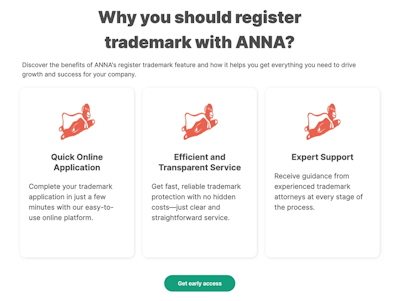

Learn how to open an LLC bank account, including the documents you need, the step-by-step process, and tips to manage business finances effectively.

Can you even register an LLC company and open an LLC bank account in Australia?
Well, yes – you can, but it is not as straightforward as setting up a local Pty Ltd (proprietary limited company) in your home country.
Still, this guide will show you exactly how to make it work – from registering your foreign entity to opening a business bank account and managing your finances the smart way.
Let's start!
What is LLC?
A Limited Liability Company (LLC) is a type of business structure that combines elements of corporations, partnerships, and sole traders, and it is widely used in the United States.
The primary qualities of an LLC include:
➡️ Limited Liability Protection - Owners (known as "members") are typically not personally liable for the company's debts or legal responsibilities. This means that your personal assets are safeguarded if the company is sued or has creditors unless there is fraud or unlawful conduct.
➡️ Pass-Through Taxation - LLCs normally do not pay taxes on their revenues directly. Instead, revenues and losses are "passed through" to members, who include them on their personal tax returns, avoiding the double taxation that businesses frequently suffer.
➡️ Flexible Management and Ownership - An LLC can have one or more members, including individuals, businesses, other LLCs, and foreign entities. The management structure is adaptable and can be customised in an operating agreement.
➡️ Ease of Formation and Compliance - Forming an LLC often includes submitting articles of organisation with a state government and maintaining compliance with state-specific requirements, which are generally less complex than those for corporations.
❗Important: LLC vs PTY LTD
Australia does not formally recognise the "LLC" (Limited Liability Company) structure as used in the United States.
Instead, the closest comparables are "Pty Ltd" (proprietary limited) companies or other business structures like partnerships, trusts, or solo traders.
If you want to manage an LLC in Australia, you will need to register a US-based LLC and manage it as a foreign entity in Australia.
How to Register a Foreign Company in Australia?
Follow these steps:
✅ Step 1: Ensure That the Name You Want to Register Is Free To Use
You may only use a name that is not the same as the name of an existing company or business in Australia. Use ASIC Check name availability tool search to see if the desired name is available.
You cannot use phrases that may mislead people about the business's activity.
This includes names that imply a relationship to the Australian government, the British Royal Family, or an ex-service organisation where none exists.
You should also ensure that your name does not violate any existing trademarks.
✅ Step 2: Submit Form 402
To register a foreign company, fill out Form 402, Application for Registration as a Foreign company.
You must supply general information about the proposed business and how it will be operated.
If foreign company directors do not already have a director identification number (director ID), they must apply for one under the law.
If your suggested name is not available, ASIC will reject your application, and you may request a refund of the application fee.
✅ Step 3: Include Supporting Papers
You must ensure that all of your supporting documents match the standards.
If the document being lodged is not in English, you must offer a satisfactory translation into English. When you submit Form 402, you must include a:
- Certified copy of the entity's certificate of incorporation or registration
- Certified copy of the constitution
- Memorandum appointing the local agent or granting power of attorney
- Memorandum outlining the powers of certain directors
✅ Step 4: Submit Form 402 With the Fee and Accompanying Papers
Form 402 must be signed by the proposed foreign company's director or secretary or its local agent. Keep in mind that you have to submit it with the appropriate fee of $597.
Send the completed Form 402 and any supporting papers to:
Australian Securities and Investments Commission
PO Box 4000
Gippsland Mail Centre VIC 3841
After your application has been processed and approved, ASIC will send you a registration certificate and your Australian Registered Body Number (ARBN).
💡ProTip
ANNA's online trademark registration allows you to swiftly and easily protect your brand and intellectual property!

What is ARBN?
An Australian Registered Body Number (ARBN) is a nine-digit identification assigned by the Australian Securities and Investments Commission (ASIC) to businesses that register with ASIC but are not registered as Australian companies.
This includes both foreign companies and registrable Australian bodies, such as incorporated associations and some statutory bodies.
ARBN:
- Is assigned specifically to foreign companies who register to do business in Australia, as opposed to Australian-registered companies that receive an Australian Company Number (ACN).
- Must be included on all public papers, negotiable instruments, contracts, and official correspondence relating to the foreign company's Australian operations.
- The ARBN remains with the foreign company throughout its Australian activities, regardless of ownership or structural changes.
- The ARBN helps promote transparency and regulatory compliance for foreign companies operating in Australia and is publicly searchable through ASIC.
How to Open an LLC Bank Account in 3 Steps?
Now that you have successfully registered your foreign LLC, follow these steps to open an LLC bank account:
✅ Step 1: Choose a Bank - The Big Four banks (ANZ, Commonwealth Bank, NAB, and Westpac) are the best traditional options for a foreign LLC registered in Australia because of their wide business services and international features.
✅ Step 2: Prepare Required Documentation:
➡️ Proof of company registration:
- The ASIC registration certificate identifies your LLC as a foreign company.
- Australian Registered Body Number (ARBN).
➡️ Business Identification:
- The registered office address is in Australia.
➡️ Personal Identification of Key Individuals:
- All directors, beneficial owners, and signatories must provide identification documents (such as a passport or driver's license).
- Shareholders with greater than 25% ownership have to provide evidence of identity.
- Foreign tax residents receive Tax Identification Numbers (TINs).
➡️ Ownership and Control Details:
- Details about the company's ownership and control structure.
- Proof of a local agent or representative:
➡️ Document appointing a local agent or representative in Australia.
✅ Step 3: Meet the Bank’s Identification Requirements - Australian banks use a 100-point ID system, with passports and driver's licenses receiving the most points. While some banks allow you to start the application online, you or your local representative may still need to verify your identity in person at a branch.
Conclusion
Understanding the variations in business structures, navigating foreign company registration, and finally opening a compliant bank account are all possible with adequate planning and guidance.
ANNA Money emerges as a valuable tool in this way!
While it is not a bank, its useful financial features assist multinational enterprises in being compliant, organised, and financially aware – all without the traditional corporate cost.
Whether it's handling taxes, automating payments, or controlling cash flow, ANNA's capabilities are designed to provide your foreign company with the competitive advantage it requires to survive.
How Can ANNA Money Help Manage Finances and Run a Foreign Entity?
Although ANNA Money is not a bank but a business tool, it can truly help you manage your business and finances. Here's what you can get with this tool:
⚡ Virtual Office Address - Secure your business with a virtual office address and work from wherever you want.
⚡ Easily Create and Send Invoices - Simply talk with ANNA ONE, provide the information, and ANNA will create the invoice.
⚡ Automated Invoice Matching - Automated invoice matching helps you stay organised and up to date. ANNA analyses payments in your account and compares them to invoices sent.
⚡ Get Paid on Time - Never have to worry about chasing unpaid invoices again. ANNA automatically sends kind reminder emails for missed payments, ensuring that you get paid on time.
⚡ Efficient Financial Management - Connect all of your company and personal accounts to ANNA for a comprehensive view of your financial assets and manage everything from a single platform.
⚡ Instant Payment Notifications - Receive real-time notifications anytime a payment is made or received, allowing you to keep track of your cash flow.
⚡ Scheduled and Recurring Payments - ANNA handles planned payments and notifies you of any changes in advance, ensuring that you never miss a payment deadline.
⚡ Tax Coverage - ANNA +Taxes solves all of your tax needs, including payroll, GST filing, and Corporation Tax.
⚡ Bookkeeping Score - Keep an eye on your bookkeeping performance.
⚡ Pots - Pots automatically set aside a percentage of your business's profits to cover prospective tax bills.
Sign up today and simplify your finance management!
FAQ
What Structure in Australia Would Be Equivalent to an LLC?
While Australia does not have a formal "LLC" structure like the US, the Australian counterpart is the Proprietary Limited Company (Pty Ltd), which offers limited liability, privacy, and flexible management under Australian corporate law.
Are There Any Specific Fees for Opening an LLC Bank Account in Australia?
Yes, usually, there are fees for creating and keeping an LLC (or business) bank account.
While many banks provide free account opening, there are sometimes continuing fees and transaction charges. Here’s an overview of the typical fees you can expect:
1. Monthly Account Fees
2. Transaction Fees
3. Establishment Fees
4. Currency Exchange and International Transaction Fees
5. Online Banking Fees
Do I Need to Register for GST as a Foreign Company?
Yes, as a foreign company, you must register for Goods and Services Tax (GST) in Australia if your business has a GST turnover of $75,000 or more from sales related to Australia and made in the course of your enterprise.







